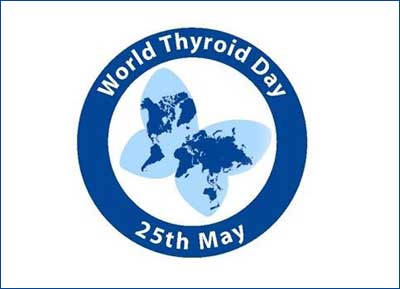- Home
- Editorial
- News
- Practice Guidelines
- Anesthesiology Guidelines
- Cancer Guidelines
- Cardiac Sciences Guidelines
- Critical Care Guidelines
- Dentistry Guidelines
- Dermatology Guidelines
- Diabetes and Endo Guidelines
- Diagnostics Guidelines
- ENT Guidelines
- Featured Practice Guidelines
- Gastroenterology Guidelines
- Geriatrics Guidelines
- Medicine Guidelines
- Nephrology Guidelines
- Neurosciences Guidelines
- Obs and Gynae Guidelines
- Ophthalmology Guidelines
- Orthopaedics Guidelines
- Paediatrics Guidelines
- Psychiatry Guidelines
- Pulmonology Guidelines
- Radiology Guidelines
- Surgery Guidelines
- Urology Guidelines
World Thyroid Day: One third Indians suffer from hypothyroidism

North India witnesses maximum cases of hypothyroidism as compared to rest of the Indian population
- · Subclinical Hypothyroidism emerged as the biggest thyroid disorder across India
New Delhi: SRL Diagnostics, in their recent retrospective data analytics report published on thyroid panel test has found out that about 32% of the Indian population is suffering from various kinds of thyroid disorders. The analysis is based on in-house data collected from over 33 lakh adults pan India over a time period of 2014-2016, where all three thyroid panel markers, namely TSH, T4 and T3 were included to produce a comprehensive data analysis, out of which 68% of reports were normal.
Subclinical hypothyroidism, a milder form of hypothyroidism, where the diagnosis is made mostly serendipitously is the most prevalent form of thyroid disorder across the country with its maximum cases present in the East zone. North India witnesses maximum cases of hypothyroidism while the South and West zones have more cases of hyperthyroidism and its variants.
Commenting on the same, Dr. Avinash Phadke, President Technology & Mentor (Clinical Pathology) from SRL Diagnostics said “This data shows a vital map of how thyroid abnormalities are present all across the country in its various forms. The finding of subclinical hypothyroidism as the most widespread thyroid dysfunction in India is not that unexpected, as without regular testing this condition remains clinically undetected. We have seen a steady rise in preventive health check testing at SRL, and believe many such apparently healthy individuals might actually have subclinical hypothyroidism. The overall abnormality figures reported in this analysis might be on the higher side because, being a national diagnostic chain of pathology laboratories SRL tests many overtly hypo or hyperthyroid patients; thus creating a positive bias towards abnormality.”
Thyroid diseases are more commonly seen in women and cause a multitude of problems, most notably, weight gain and hormonal imbalances. However, even men are at risk, though their chances of suffering from thyroid diseases are considered to be less as compared with women.
Symptoms of underactive thyroid are similar in men as they are in women, with weakness, fatigue, weight gain, depression and high cholesterol dominating day to day life. But a few symptoms like decrease in muscular strength, erectile dysfunction and decrease in sex drive are more frequently reported by men. Though common statistics reports that men have up to 8 times less chance of developing a thyroid disorder than women, it would be amiss to remove it as a threat altogether. With early diagnosis and treatment, thyroid hormone replacement is a safe and effective treatment that can manage one’s symptoms and prevent complications. As this report showed subclinical hypothyroidism, in which thyroid functions just below normal level, is a silent disease which is being increasingly diagnosed in the Indian population.
“Genetics play a crucial role in both determination of thyroid hormones and TSH concentrations, and susceptibility to autoimmune thyroid disease.. People who have a history of thyroid problems in their family would be predisposed to thyroid abnormalities. Thus, it is important to be aware of your family’s medical history because it will directly influence yours”. – added Dr Phadke.

Disclaimer: This site is primarily intended for healthcare professionals. Any content/information on this website does not replace the advice of medical and/or health professionals and should not be construed as medical/diagnostic advice/endorsement or prescription. Use of this site is subject to our terms of use, privacy policy, advertisement policy. © 2020 Minerva Medical Treatment Pvt Ltd